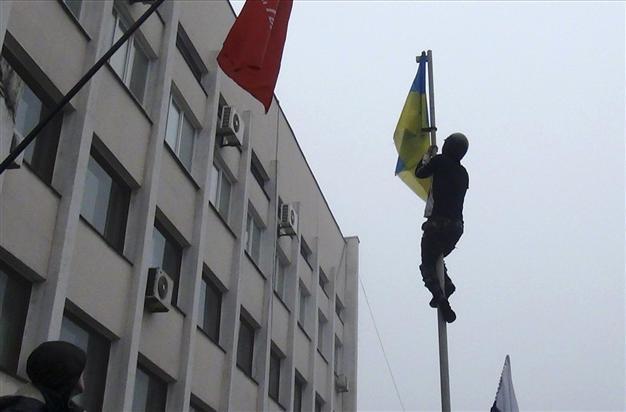Ukrainian president threatens military operation as unrest grows
SLAVIANSK/KYIV - Reuters

A man climbs up a post to remove a Ukrainian flag as protesters hold a rally outside the mayor's office in Mariupol , April 13. REUTERS Photo
Ukraine's president on April 14 threatened military action after pro-Russian separatists occupying government buildings in the east ignored an ultimatum to leave and another group of rebels attacked a police headquarters in the troubled region.Acting president Oleksander Turchinov also held out the possibility of a referendum on the future shape of the Ukrainian state, partly addressing demands made in the largely Russian-speaking east for more control over their local affairs.
As the 9 a.m. (6 a.m. GMT) deadline issued by authorities in Kyiv expired, a Reuters reporter in the flashpoint city of Slaviansk, where armed men had seized two government buildings, saw nothing to show the rebels were obeying the ultimatum.
At least 100 pro-Russian separatists attacked the police headquarters in the city of Horlivka on Monday, a witness told Reuters, and video footage on Ukrainian television showed an ambulance treating people apparently injured in the attack.
In all, separatists have seized government buildings and security facilities in 10 cities.
Angered by the death of a state security officer and the wounding of two comrades near Slaviansk, Turchinov warned rebels that an anti-terrorist operation involving the army would begin unless they laid down their arms, and that the Donbass region of eastern Ukraine "will soon be stabilized."
His warning raised fears of possible Russian military intervention, but there were no signs of any Ukrainian forces in Slaviansk on April 14 and no sign of an anti-terrorist operation.
Outside the city council offices stood a group of about 12 armed men in matching camouflage fatigues, with black balaclavas, one of whom was holding a Russian flag.
They said they were Cossacks but did not say where from. One told Reuters: "The borders between Ukraine, Russia and Belarus are artificial and we are here to take them away."
The new element in the operation announced by Turchinov is the inclusion of the army which has not been involved in more than four months of turmoil and is untested in dealing with internal disorder.
The move to bring in the army shows a lack of confidence in the 30,000-strong interior ministry troops which have been discredited by identification with the leadership of ousted president Viktor Yanukovich.
Green light for status referendum
Turchinov and other leaders blame Russia, which annexed Ukraine's Crimea region when Moscow-backed Yanukovich fled after months of pro-Western protests, for inspiring and organising a rash of rebellions in Slaviansk and other Russian-speaking towns in eastern Ukraine.
Turchinov said the Kyiv leadership was "not against" a nationwide referendum being held on the type of state Ukraine should be and added he was sure it would confirm the wish of the majority for a united, independent country.
The holding of a referendum has been one of the demands of the separatist rebels in eastern Ukraine, although they envisage a poll being held only in their home region. Turchinov such a referendum could be held at the same time as a presidential election on May 25.
Russian Foreign Minister Sergei Lavrov said Ukraine's Russian-speaking eastern regions should be involved in drafting a constitution that should be put to the referendum.
Lavrov said it was not in Russia's interests for Ukraine to break up, but Moscow wanted all citizens of the country to be given equal treatment by Kyiv.
He denied Ukrainian and U.S. allegations that Russia had undercover agents fomenting unrest in eastern Ukraine, and said he was seeking explanation of media reports that the director of the CIA, John Brennan, had visited Kyiv.
The crisis in Ukraine has brought relations between Russia and the West to their worst since the end of the Cold War in 1991, and also risks unleashing a "gas war" which could disrupt energy supplies across Europe. Ukraine said on April 12 it would stop paying for Russian gas because the price was too high.
Russia warns against use of force
Use of force by Kyiv's pro-Europe authorities could trigger a fresh confrontation from Russia. Russia's foreign ministry called the planned military operation a "criminal order" and said the West should bring its allies in Ukraine's government under control.
The United Nations Security Council held an emergency session on the night of April 13, and the United States warned that it was likely to impose further sanctions on Russians close to the Kremlin if the escalation in eastern Ukraine continues.
European Union foreign ministers were due to discuss whether to impose further sanctions on Moscow.
British Foreign Secretary William Hague said the destabilisation of eastern Ukraine was clearly being instigated by Russia, adding: "I don't think denials of Russian involvement have a shred of credibility."
German Vice Chancellor Sigmar Gabriel warned of an escalation of the crisis in Ukraine, saying "Russia was clearly prepared to allow tanks to roll across European borders."
In Slaviansk as of 9 a.m. local time on April 14, a Russian flag still flew over police headquarters, one of two buildings taken over by the separatists in the town, while masked men continued to man barricades of sandbags in front of it.
Even as the deadline passed, a truck appeared bringing more tires to heap on top of the barricades to reinforce them.
There was tension in the air as people tried to go about their normal business, though school and colleges have been closed and parents advised to keep their children indoors.
















